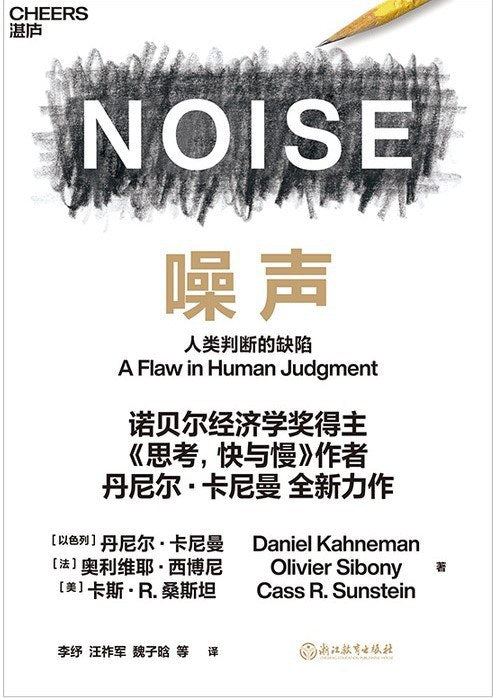WULOLIFE
《噪声》副标题: 人类判断的缺陷 作者: [以色列] 丹尼尔·卡尼曼 / [法] 奥利维耶·西博尼 / [美] 卡斯·R.桑斯坦
《噪声》副标题: 人类判断的缺陷 作者: [以色列] 丹尼尔·卡尼曼 / [法] 奥利维耶·西博尼 / [美] 卡斯·R.桑斯坦
Couldn't load pickup availability
Description
内容简介 · · · · · ·
诺贝尔经济学奖得主、行为经济学之父
丹尼尔·卡尼曼继《思考,快与慢》后
酝酿10年思考的全新力作
◎ 内容简介
想象一下,两名医生对相同的病人给出了不同的诊断;两名法官对犯了同罪的嫌疑人给出了不同的判决。再想象一下,同样的医生、法官或决策者做出了不同的决策,而这种决策仅仅取决于决策是在什么时间做出的。这些不同决策背后的罪魁祸首,就是“噪声”。
《噪声》是诺贝尔经济学奖得主、“行为经济学之父”丹尼尔·卡尼曼携手决策领域专家奥利维耶·西博尼和卡斯·桑斯坦共同推出的重磅新作,也是卡尼曼继畅销书《思考,快与慢》之后酝酿10 years ago领域又一重大发现。几十年来,大家都认为,偏差是导致人类判断出错的关键。但是今天,卡尼曼系统性地指出:噪声,才是影响人类判断的黑洞。
《噪声》一书通过系统性研究,通过两个公式揭开了“判断出错”的本质,并且通过对三种噪声的系统性分析带你直击噪声。并且,从六大部分阐述了“噪声”:从寻获噪声到探究人类判断的本质,从预测噪声到阐释噪声的主要原因,从探讨如何改进判断和防止错误的的实际问题,一直延伸到什么才是合适的噪声水平。”“噪声”是随机的,但却是致命的。卡尼曼在书中提出了6大原则,帮你重塑决策框架,做聪明的决策者。同时,卡尼曼更是精妙地附上了“审查噪声”的使用指南,以及写给决策者的“观察者清单”。
如果说《思考,快与慢》击退的是人类判断过程中面对的敌人“偏差”,那么《噪声》要绝杀的就是其中的另一大隐形敌人——噪声。阅读本书可以助你重塑自己的决策框架,远离噪声,做聪明的决策者。
◎ 编辑推荐
☆诺贝尔经济学奖得主、行为经济学之父丹尼尔·卡尼曼,继《思考,快与慢》后酝酿10 years,行为科学领域又一重大发现。
☆是关于人类判断的又一颠覆性著作,两个公式揭开了“判断出错”性分析带你直击噪声。
。
☆ 《噪声》一经出版便风靡全球31个国家与地区,吸引了无数商业人士的目光,被投资人、心理学家、众多媒体人争相盛赞。他们真诚地希望:让更多人了解噪声。
◎ 各方赞誉
从“偏差”到“噪声”,作为心理学家的卡尼曼挑战的是经济学的“理性人”假设,并因开启了行为经济学的大门而获得诺贝尔经济学奖。他一直关注分析人类在决他深入分析了噪声的影响,但也乐观地预期,可以通过发掘埋没 在大数据中的信息来减少决济学领域的新趋势。——巴曙松,北京大学汇丰金融研究院执行院长、中国银行业协会首席家
继《思考,快与慢》之后,湛庐又推出了卡尼曼的新作《噪声》。本书开篇就对噪声(noise)与偏差(bias) 做了区分。偏见是系统性的错误。这个区别你一旦听到,立刻就能知道它十分重要。《噪声》通过司法 判决、医学诊断等多个领域的实际案例,探讨了噪声的成因以及减少噪声的策略。三位作者还讨论了克服噪声的努力也会带来负面后果。又一本读着不累却时时受益的好书。——陈嘉映,首都师范大学哲学系教授
阅读卡尼曼等人的新作让我兴致盎然、心潮澎湃。可以肯定地说,通过理解并实践卡尼曼等人的思想与建议,我们能知道如何减少可能会困扰组织和个人的系统噪声,知道“决策信息的简约化”居然也如此意义重大! 并且,更为重要的是,我们能够学习在噪声中运用科学知识,深刻的洞见和坚实的原则,做出更为人道、更为公平的决策,减少时间、资金和人才的浪费,拯救生命,传递友善,分享意义。而这些,都是一个真实清华大学社会科学学院院长
人类判断的错误源于偏差和噪声。当人们表现出不同的偏差时,噪声就产生了。卡尼曼因在心理偏差研究方面做出的突破性贡献而获 本书对于噪声的分析充满不凡的洞见,并更新了我们对已有众多决策研究发现的认知。《噪声》 一书中关于减少噪声的方法,既能让人变得聪慧,又有助于那些自命不凡的“专家”纠正无知。——张志学,北京大学光华管理学院教授
在判断与决策问题上,管理者和专业人士往往都非常自信。卡尼曼与合作者的这部新书《噪声》再次告诉我们:人类远远不如我们想象的那么理人类的判断也远远不如我们想象的那样准确。对于决策者来说,“认识你自己”是一个永恒的主题;警惕认知中的缺陷,比什么都重要。如果 2021年只能推荐一本书,那我推荐《噪声》。——宫玉振,北京大学国家发展研究院管理学教授、BiMBA商学院副院长兼 EMBA 学术主任
《噪声》提供了一个正确的认知体系,对于日益富足但仍然对未来颇有代的大变局下,政治经济形势高速变化的新环境面前,在决策过程所面临的噪一个新的认知体系显得尤为重要和迫切。——朱 宁,上海交通大学上海高级金融学院金融学教授、副院长
可以完全有效地判断信息。但丹尼尔 · 卡尼曼和他的合作者指出这个假设在很多情况下和事实并不相符,因此众多的理论结人的判断误差包括两个部分:偏差本书对噪声的分析完成了对误差的系统阐述。任何希望获得更高程度理性的个人或机构,都应该仔细阅读卡尼曼的这本新书。 ——刘劲,长江商学院副院长
人生经历就是所有抉择的总和,工作与生活在一次次的抉择中潜移默化地发展变化。没有人可以永远做出正确的抉择,总有噪声在影响判断力。噪声是不可消除的,但我们断将噪声的影响降低。 《噪声》一书所提供的就是一套对于人生抉择大有裨益的减少噪声的方法论。 我要将《噪声》博士、优客工场创始人
决策无处不在,而“噪声”与“信号”在其中穿插交错,互为影响。《噪声》一书道出长久以来为人们所忽视的主观判断缺陷——AI AI 之后的“人”却依旧是无法回避的场景。我们需要充分将个体复杂性融入组织决策考量之中,去探索商业与人的更合理关系。我们都期待一个噪声更少的清朗世界。——吴声,场景实验室创始人
自然界存在尚未被感知的法则,无形中影响着人们的决策。《噪声》这本书将“人类大脑”与“测量工具”同类对比,指出噪声的存在。这一重大发现将为企业的正确决策提供新的方法论,也为企业家带来更深层的思考。对于长期与噪声共舞的企业而言,我们对本书中三位作者提出的新概念感到惊喜,并在阅读中被“噪声的形成”和“决策卫生”这一系列科学性的理论所折服。反观漫步者走过的25 载,我们自上而下秉持着“敬畏、尊重、谦卑和良善”的管理理念,居然无形中用到了《噪声》提及的方法论,因而在很大限度上降低了噪声相信这本由 的科学论著是普适的,必然也能启迪你的智慧,为“人与世界的交互”注入新的创造力。——张文东,漫步者董事长、总裁
知识精英往往在智力选拔中建立起优越感,斡旋于名利场中获得成就感,但他们是否因此而逼近理性呢?们先贤提出的“君子时中”,可能是对信息决策中的偏差和噪声的一种敬畏吧。——归江,信璞投资合伙人
很多大型企业和大型机构都强调,各个员工、各个基层单位的判断和决策,要跟核以为这样就可以做出好的判断和决策,但往往事与愿违。执行具体操作的人,做出的判断和决策品质不佳、误差多多,过程也杂乱无章。这就如同一支演奏水平低劣的交响乐团,面对乐团指挥,各个乐手演奏出 对这种很不一致的杂乱误 差,应如何定义,如何测量,如何系统性地减少?地论述了这些问题。深入领会。这样做会大大提高企业乃至整个社会的公平性和效率。此书必读,此书必用。——刘建位,央视十集《学习巴菲特》节目主讲人、《巴菲特选股10 招》等书作者
人们担忧“算法统治世界”,其实是担忧暗藏在庞杂算法背后的 “噪声污染”认知局个更少噪声的世界,是卡尼曼这本书关注的焦点。《噪声》是一本值得从头细读到尾的著作,对那些想提升认知水平、决策品质的组织与个体来说,“决策卫生”这个词一 定会击中你的心灵。——段永朝,财讯传媒集团首席战略官、苇草智酷创始合伙人
面对环境、信息等多重不确定条件,如何审慎分析判断并做出恰当决策?卡尼曼教授的新作《噪声》提供了全新的方法论,让我们在警惕主观偏差的同时,学会发现并剔除系统噪声。——何刚,《财经》杂志主编、《哈佛商业评论》中文版主编、《巴伦周刊》中文版联合创始人
人生是由大大小小的判断组成的。判断即人生。判断不仅会受偏差的影响,还会受噪声的影响。如果说偏差造成“决策的不全面性”,噪声则造成“决策的不一致性”。噪声和人的个性、偏好以及外部环境但影响巨大。 《噪声》的启示是,我们会和噪声相伴,但也有方法重塑决策框架,让自己做出更好的决策。——秦朔,中国商业文明研究中心发起人、秦朔朋友圈发起人
《噪声》是一本很特别的书,作者从心理学的角度出发,通过各种生动的案例和实验,把“噪声”这一不同于“偏差”的概念完整清晰地呈现给我们。三位作者抽丝剥茧地分析了当我们在各个领域做出判断时,噪声可能带来的影响,以及如何减少其中的不利中文网出版人
《噪声》的影响是震撼性的,因为它探究了人类判断的一种根本性且被严重低估的危险。《噪声》是一本必读书,它提供了减少决策错误的可行方法。——罗伯特·西奥迪尼,畅销书《影响力》作者
在《噪声》一书中,三位作者巧妙地将他们对人类判断缺陷的独特新颖见解,运用到人类在各个领域的判断问题。做出判断和决策的人范围甚广,球教练到央行行长、军事指挥官,乃至国家元首, 是心理学领域的一项了不起的成就,也是一座里程碑。——菲利普·E. 泰特洛克,畅销书《超预测》作者
杰作!卡尼曼、西博尼和桑斯坦将《噪声》引入生活,令人信服地解释了为什么我们应该像对待偏差一样对待人类判断中的随机变化,并为减少判断中的噪声(和偏差)提供了实用的解决方案。——安妮·杜克,畅销书《对赌》作者
丹尼尔·卡尼曼(Daniel Kahneman)
诺贝尔经济学奖得主,美国总统自由勋章获得者,全球畅销书《思考Eugene Higgins Professor of Psychology, Princeton University, School of Public and International Affairs)献奖。卡尼曼在心理学上的成就是挑战判断与决策的理性模式,被公认为“继弗洛伊德之后,当代最伟大的心理学家”。他的跨领域研究对经济学、医学、政治学、社会学、社会心理学、认知科学等领域都产生了深远的影响,被誉为“行为经济学之父”。
奥利维耶·西博尼(Olivier Sibony)
牛津大学赛德商学院(Saïd Business School, University of Oxford)外籍教授,曾在询公司(McKinsey & Company: Harvard University Business Review: MIT Sloan Management Review Before You Make That Big DecisionYou Are About to Make a Terrible Mistake
卡斯·R. 桑斯坦(Cass R. Sunstein)
主要研究领域为White House Office of Information and Regulation Affairs)主任;2013—2014年加入白宫情报与通信技术审查小组(Review Group on Intelligence and Communications Technologies);2016—2017年加入美国防国防创新委员会(Defense Innovation Board)。著有多本《纽约时报》泰勒的《助推》(Nudge)、基于电影《星球大战》(Star Wars: The World According to Star Wars,以及《助推2.0》(How Change Happens
